- Home
- Colleen Gleason
The Chess Queen Enigma Page 3
The Chess Queen Enigma Read online
Page 3
“I am not avoiding—don’t be absurd. That’s ridic—”
“Well, you nearly died. No one would blame you if you didn’t want to get involved again.” Her voice had become quieter. Almost sympathetic.
I struggled to keep my temper and expression under control. I wasn’t about to admit I’d clawed myself out of a nightmare early this morning in which I was reliving those terrifying moments of being strapped to a statue, preparing to be electrofied by the villainess herself. Aside from that, I’d felt that same sort of underlying sympathy coming from Evaline more than once in the last few weeks—since we’d realized my mother had been Miss Stoker’s vampire-hunter mentor. Neither of us had attempted to discuss this discovery; it had been a strange and unsettling moment, leaving us both silent and uncertain. Even I had no desire to talk about it. And so the knowledge hung there between us like a puffy black cloud.
“Make no mistake, Miss Stoker. I fully intend to find and bring the Ankh to justice. But for now, we really must focus our attentions on the matter at hand. The museum is just two blocks away, and—”
My companion gave a derisive snort and slumped back into her corner. I took this as invitation for me to commence with educating her about the history between England and Betrovia. “The relationship between our nation and that of Betrovia is long and varied, and fraught with upheaval, mistrust, and competition—but it comes down to two important things: we British have become great consumers of the unique and beautiful Betrovian fabric, and the Betrovians wish to supersede Paris as the center of fashion in the civilized world. Therefore, the Betrovians wish to have open trade and excellent diplomatic relations with England because of the reaches of our Empire, and our deep pockets. But it’s only been fifty years since the Betrovians returned the Theophanine Chess Table and we’ve reinstated a working trade agreement.”
“What on earth does a chessboard have to do with anything?” Evaline asked rudely.
That was my opportunity to launch into the explanation I’d been trying to give. “The chessboard and pieces were separated centuries ago during a war in Byzantium. The chessboard was promised to Queen Elizabeth as a gift—she had, at some point, acquired the pieces of the chess set— but the King of Betrovia refused to let her have it. That is what caused the great rift between our countries, and it was only fifty years ago that the chessboard was finally delivered to Her Majesty here in London. I’m certain you recall seeing it—it’s a massive piece built into a table—and it’s displayed in the Third Graeco-Roman Saloon. Surely you—”
The carriage gave a great jolt, nearly throwing me off my seat as the vehicle slammed to a halt. Evaline and I looked at each other, then swung to look out our respective windows.
The last time we’d experienced such an event, that scoundrel Mr. Pix had engineered the cessation of traffic merely so he could deliver a message to my companion. Apparently, flair and dramatics were his modus operandi. But this time, it appeared he had no hand in the mess on the lower street level . . . for the thoroughfare was filled with people celebrating the arrival of the Betrovians.
Flags of purple and gold, emblazoned with the Betrovian seal, fluttered from extendable rods from whence they were waved by a great number of spectators at every street level. I wondered whether the flags were made from Betrovian silk or plain old British cotton. There were a great number of them, as if someone had distributed the pennants and gathered the bystanders into place to ensure a celebratory welcome for our foreign guests.
I chafed at the delay as our carriage wended its way through the throngs of people on the street and then turned into the drive of the museum. At last it was our turn to alight, and as one of the guards assisted me to step down, I spied several people making their way up the long, low staircase to the side entrance of the museum.
The gentleman who caught my eye wasn’t particularly tall, but he carried himself with such authority that he appeared to tower over everyone near him. Dressed in the most regal and up-to-date fashion, the man moved smoothly and gracefully despite the copper-knobbed cane he employed to climb the steps. I knew the necessity of the cane was due to an accident he’d suffered at the hands of a business rival several years ago, which had resulted in the death of his business partner.
The gentleman wore a tall hat with a particularly curly brim, but I had seen pictures indicating he had a full, thick head of dark hair just beginning to thread with gray at the temples. He sported long sideburns and was otherwise cleanshaven. His handsome features might have been carved from marble. The press reported his age to be approximately forty, but based on what the man had accomplished, I suspected he could be a year or two older.
“Is that Mr. Oligary?” asked Miss Stoker in an undertone.
However, her circumspection wasn’t needed in this particular situation, for the crowds were loud (now they were singing the Betrovian National Anthem), and the sound of a loud motor above us (a small dirigible pulling a welcome sign behind it) would have drowned out her question for anyone but me.
“Yes, it is,” I replied, my eyes still fastened on the man who had been nicknamed the Genius of Modern Times. I have no idea who would have dubbed him with such a simplistic and exaggerated appellation, but the press had taken hold of the phrase and that was the end of that. “I’ve never actually met the man, but of course he is very recognizable from the photographs which appear weekly in the papers.”
“And there are Lord and Lady Cosgrove-Pitt,” my companion pointed out.
Her comment was unnecessary, for it was just as impossible to miss the Parliamentary leader and his wife as it would have been not to notice the Queen herself. He was short and muscular, but very distinguished and with a voice that carried easily over the crowds (and, one presumes, through the walls of Westminster). He was speaking emphatically to a companion as he guided his wife by the arm. Lord Cosgrove-Pitt doffed his hat just as they stepped into the museum, and I saw the silver of his hair and muttonchop sideburns.
For once, I paid little attention to Lady Cosgrove-Pitt other than sparing a moment of admiration for her fashionable magenta dress and the matching handleless parasol that hovered mechanically above her head, for my attention had been drawn to a broad-shouldered, ginger-haired figure who climbed nimbly up the steps in the wake of his distant relatives.
“Isn’t that Inspector Grayling over there?” There was a definite smirk in Miss Stoker’s tone. “He is a remarkably tall man, isn’t he?”
“I’m perfectly capable of observing and identifying the attendees of today’s event all on my own,” I told her primly as I did my best to keep from looking for that abominable steamcycle Grayling insisted on driving. I had no idea where he would have parked the monstrosity. “You needn’t point out every individual walking up the steps.”
Evaline didn’t respond, but I noticed the curve of her cheeks and the way she ducked her head to hide the sparkle in her eyes. “I wonder if he’s here in an official capacity, or as an escort to the Cosgrove-Pitts.”
I sniffed and sailed through the open door into the museum, leaving Miss Stoker to follow with her shorter strides. I had nothing further to say on the subject of Inspector Grayling, and I sincerely hoped we would not cross paths during this event.
Fortunately, Miss Stoker and I had been given our directions yesterday during a brief tour with Princess Alix and Miss Adler, so we were able to avoid the throng of people that milled about the Roman Galley. Instead, we turned to the right and walked through the Grenville Library to the Assistant Keeper’s Room, where we were to meet the Betrovian princess.
“Miss Evaline Stoker and Miss Alvermina Holmes,” announced a guard as he opened the door to a private parlor with a flourish.
I managed not to wince at the use of my full name and stepped into the small chamber. There were only three other people in attendance, but the place was filled with an abundance of antiquities. Unlike in other areas of the museum, where the valuable artifacts were kept in glass cases and far out of the
reach of inquisitive fingers, here was a display meant to be examined with not only the eye, but the touch and perhaps even smell.
Small golden Egyptian statues, jade and onyx beaded jewelry, glass mosaic vases and platters, plate-sized paintings, and numerous other ancient objets d’art sat on tables, open shelves, and on the floor. I could only imagine what they were worth—more than the Crown Jewels of England, I surmised.
I would have looked at them all day, but my attention was drawn to Princess Alix. Fortunately, I hadn’t forgotten my manners, for I’d dropped into a fairly graceful curtsy as my name was intoned a second time—in this instance by the princess herself.
“Her Royal Highness Lurelia Gertillia Vasvenne, I am pleased to present Miss Mina Holmes and Miss Evaline Stoker. They have offered to be your companions during your visit, and I am quite certain you will enjoy their company immensely.”
As I rose from my curtsy, I looked up with no small curiosity into the face of the young woman who would be my charge for the next few weeks.
Miss Stoker
Coincidence or Conspiracy?
I have no idea of Mina’s initial impression of the princess— though it was surely more detailed than mine. For me, the first word that came to my mind when I saw Princess Lurelia was “colorless.”
She wasn’t unattractive. She was merely bland. Drab. From head to toe. She had mousy blond hair, gray eyes with blond, invisible lashes, pale lips, and fair skin. Even her dress, though made of the coveted Betrovian silk, was colorless— neither white nor cream, nor even ivory.
“I’m pleased to meet you,” said Princess Lurelia. In a colorless voice.
Her eyes held no spark of interest or enthusiasm. Her expression was merely polite. Her movements, when she inclined her head to accept our introduction, were stiff and practiced. She didn’t appear dumbstruck, or unintelligent, or even nervous or befuddled. She was simply there.
I couldn’t help but glance at Mina.
The same dismay I felt was reflected in her eyes. We were to be saddled with this girl for four weeks?
I sighed. Maybe she’d relax a bit once we got to know her.
“Mina and I are looking forward to showing you around London,” I forced myself to say brightly. My companion, for once, didn’t seem to have any wisdom to offer. “There will be parties and theater and picnics, or riding in the park if you like. And of course, we must go shopping and visit New Vauxhall Gardens.”
“I will look forward to it.” Princess Lurelia’s words were well-modulated and as smooth as if rehearsed. Her lips curved up ever so slightly at the corners.
“There is also to be the Official Welcome Ball at the Midnight Palace, hosted by Mr. Oligary,” Princess Alix said. “Tomorrow night.” She flickered a meaningful glance at me. Somehow I managed to keep from grimacing. Blooming fish, so soon?
“I look forward to it as well,” intoned the princess.
I cast another look at Mina, one that was a little more desperate. Then a thought struck me. Maybe Princess Lurelia didn’t speak English very well, and that was why she seemed so . . . dull.
Just then, the door of a curio cabinet next to me opened to reveal the inner workings of a clock. A small shelf burst forth, and on top of it were two mechanical men with sledgehammers. They took turns pounding on a tiny anvil in between them. One . . . two . . . three . . . , all the way to six.
And then a mechanized young woman trundled out onto the shelf and slammed her own hammer into the anvil. Once, twice.
It was half-past six. The ceremony was to begin promptly at seven o’clock.
“We must go,” said Princess Alix, gesturing to the door.
The Welcome Event and Exchange of National Gifts was to occur in the elegant Arched Room. Mina and I had walked through the large corridor-like library many times during our visits to the museum, but this time it was filled with people, streamers, and, to my delight, tables of refreshments. Although we had walked over with Princess Lurelia and the others, Mina and I didn’t have to make a grand entrance with them. Instead, we slipped past the stage where the ceremony was to be held, and into the small crowd.
“I see they’ve moved the Theophanine Chess Table into this chamber for the Welcome Event. That was an excellent decision and will emphasize the improved diplomatic relations between our nations,” Mina said.
I glanced over to see a massive stone table. It had a wide pedestal base and a thick round top. Presumably, that was what had caused the upset between England and Betrovia. I couldn’t imagine why anyone would care about a chess table enough to start a war.
While Mina tripped over Lord Bentley-Hughes’s overly large shoes, I headed straight for a table groaning with miniature sandwiches and some colorful liquid in rows of crystal cups. The egg-and-bacon-salad sandwich on tomato-toast was excellent, and I was reaching for another thumb-sized piece when a clock struck seven.
Trumpets sounded, echoing throughout the chamber. I looked up to see four of the long brass horns shining from one of the small balconies that overlooked the hall.
Someone used a large, mechanized funnel to announce in a tinny voice: “Her Royal Highness, Princess Alexandra.”
Everyone clapped and cheered, including me. The princess was very popular with the people. She emerged from a paper-festooned entryway and warmly greeted some of the attendees. I recognized most of them as being of the peerage— they were rich, powerful, and important people.
Speaking of rich, powerful, and important people—the next introductions were no surprise to me, for they included such important British personages as Lord Cosgrove-Pitt and Mr. Emmet Oligary.
But it was the last announcement that had me gaping in shock. “And finally, the esteemed Sir Mycroft Holmes.”
I spun to look at Mina, whose expression had gone blank, and then stood on my tiptoes to try and see what her father looked like. Why hadn’t she mentioned he would be here? I’d heard about the man, who apparently was the Queen and Parliament’s most trusted advisor, but never met him. I wasn’t acquainted with his more famous brother, Sherlock, either, but at least I’d seen pictures of the detective in the papers.
Sir Mycroft Holmes was tall and slender just like his brother, and daughter for that matter. Unlike the other members of his family, he did sport the beginnings of a paunch beneath his well-tailored coat. He had a prominent, beak-like nose and gray-threaded brown hair that was beginning to thin at the temples. The word that came to mind for him was “stony.” He seemed unapproachable, emotionless, and yet very gentlemanly. Even from where I stood, I saw cool calculation in his dark eyes as they swept the area.
I was fairly certain I saw him pause, eyes widening ever so slightly, when his attention skimmed over my companion. But Sir Mycroft gave no other indication he’d seen or recognized his daughter.
I tried to imagine why Desirée Holmes—or, as I’d known her when she was my vampire-hunting mentor, Siri—might have found the man marriageable. He exuded power, he certainly had some wealth, and he wasn’t unattractive . . . but Sir Mycroft did not seem like a man who’d woo a woman or care for a wife. He certainly didn’t care much for his motherless daughter.
“Announcing Her Royal Highness, Princess Lurelia Gertillia Vasvenne, and the Lord Regent of Betrovia, Mikalo Terrence!” cried the powerful voice.
More music began to play. Probably the Betrovian National Anthem, but I wasn’t sure. I didn’t find it very pleasant. It sounded more like a funeral march than anything meant to promote patriotism. Or maybe the point was to remind the Betrovians of those who’d died for their country?
Loud cheers erupted, and some tinny-sounding drums rolled as the two Betrovians stepped into view from beneath the arbor.
Since the Lord Regent had not been in the private chamber when Mina and I were presented to Princess Lurelia, my eyes were drawn to him. He was short and rotund and had an incredible blond mustache that extended far beyond his cheeks. It curled into black coils at the ends. What little hair he had was also
straw-blond, tipped with black, and gathered into a tail at the nape of his neck.
He seemed to be making up for the princess’s colorlessness, for his clothing was red, gold, purple, and blue. The bright hues made it hurt to look at him, so I turned to the young woman at his side.
Although she did gaze up and around, there was still no sign of interest or enthusiasm in her expression. She paced forward with her fingers on the arm of the Lord Regent, and stood as silent and still as a ghost while the ceremony proceeded.
There was a lot of talk—a lot of talk—about trade agreements and taxes and historical events that I didn’t give two figs about. Lord Cosgrove-Pitt turned out to be very long-winded, Mr. Oligary was hardly any more brief but at least he told a few jokes, and Sir Mycroft didn’t speak at all.
“Zhank you vor your most gracious welcome,” said the Betrovian Lord Regent, when all of the British speeches were finished and he and Princess Lurelia stood alone on the stage with Princess Alix.
To my dismay, the Regent rambled on for a time as well, his black-tipped mustache dipping and swaying as he spoke. On and on and on. I wondered how the two princesses could stand there so still in their heavy layers of gowns. I was fidgeting, and I wasn’t even wearing heavy court dress.
At last, the Regent seemed to wind down. “And so, as a token uff our esteem vor our English brethren, zhe Betrovian Royal Family is pleased to present Her Royal Highness Princess Alexandra with a letter—”
“A letter?” I muttered to no one but myself. “All this for a letter? That’s it? No jewels or gold or a—a mechanized horse or something like that?”
I never heard the rest of his description, for Mina’s sharp elbow jabbed me in the ribs. “The letter is from Queen Elizabeth, you dolt! I was attempting to give you its history in the carriage, but you had no interest. Perhaps now you will give me your complete attention, so you can be fully cognizant of the importance of the British-Betrovian relations.”

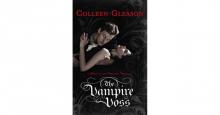 The Vampire Voss
The Vampire Voss Lavender Vows
Lavender Vows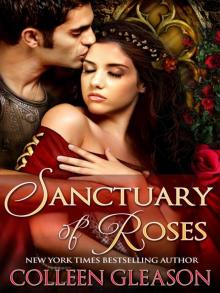 Sanctuary of Roses
Sanctuary of Roses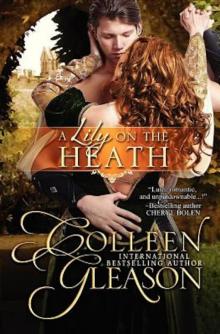 A Lily on the Heath
A Lily on the Heath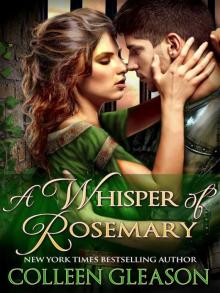 A Whisper Of Rosemary
A Whisper Of Rosemary The Rest Falls Away
The Rest Falls Away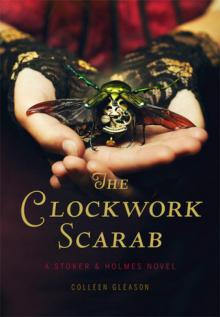 The Clockwork Scarab
The Clockwork Scarab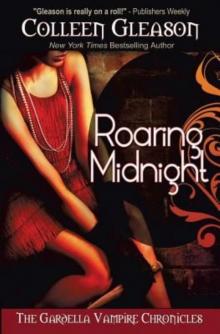 Roaring Midnight
Roaring Midnight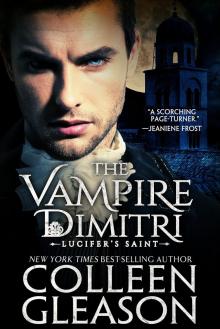 The Vampire Dimitri
The Vampire Dimitri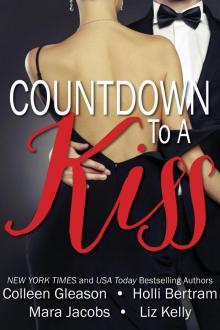 Countdown To A Kiss A New Years Eve Anthology
Countdown To A Kiss A New Years Eve Anthology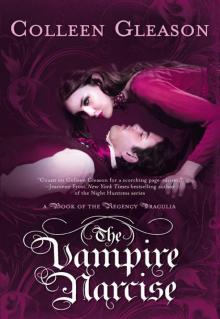 The Vampire Narcise
The Vampire Narcise When Twilight Burns
When Twilight Burns The Bleeding Dusk
The Bleeding Dusk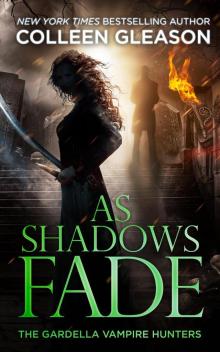 As Shadows Fade
As Shadows Fade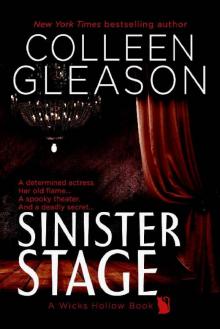 Sinister Stage: A Ghost Story Romance and Mystery (Wicks Hollow Book 5)
Sinister Stage: A Ghost Story Romance and Mystery (Wicks Hollow Book 5)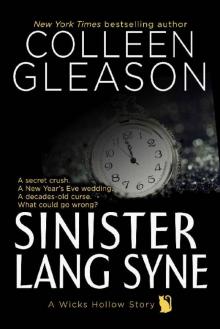 Sinister Lang Syne: A Short Holiday Novel (Wicks Hollow)
Sinister Lang Syne: A Short Holiday Novel (Wicks Hollow) Sinister Sanctuary
Sinister Sanctuary Night Beckons
Night Beckons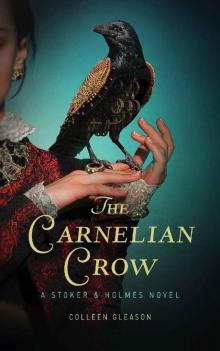 The Carnelian Crow: A Stoker & Holmes Book (Stoker and Holmes 4)
The Carnelian Crow: A Stoker & Holmes Book (Stoker and Holmes 4) The Shop of Shades and Secrets (Modern Gothic Romance 1)
The Shop of Shades and Secrets (Modern Gothic Romance 1) Lavender Vows tmhg-1
Lavender Vows tmhg-1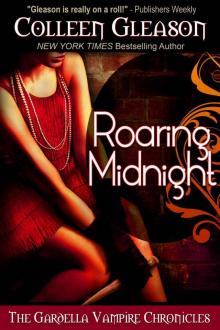 Roaring Midnight (The Gardella Vampire Chronicles | Macey #1)
Roaring Midnight (The Gardella Vampire Chronicles | Macey #1) Lavender Vows (The Medieval Herb Garden Series)
Lavender Vows (The Medieval Herb Garden Series) Dark Secrets: A Paranormal Romance Anthology
Dark Secrets: A Paranormal Romance Anthology Roaring Shadows
Roaring Shadows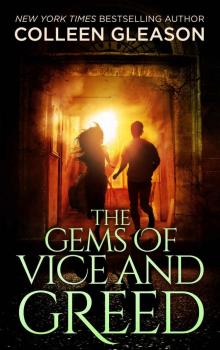 The Gems of Vice and Greed (Contemporary Gothic Romance Book 3)
The Gems of Vice and Greed (Contemporary Gothic Romance Book 3)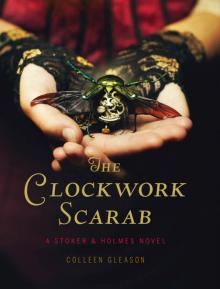 The Clockwork Scarab s&h-1
The Clockwork Scarab s&h-1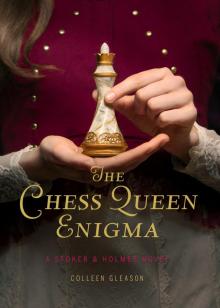 The Chess Queen Enigma
The Chess Queen Enigma Sinister Secrets
Sinister Secrets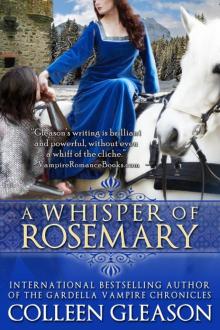 A Whisper of Rosemary (The Medieval Herb Garden Series)
A Whisper of Rosemary (The Medieval Herb Garden Series) Dark and Damaged: Eight Tortured Heroes of Paranormal Romance: Paranormal Romance Boxed Set
Dark and Damaged: Eight Tortured Heroes of Paranormal Romance: Paranormal Romance Boxed Set Roaring Shadows: Macey Book 2 (The Gardella Vampire Hunters 8)
Roaring Shadows: Macey Book 2 (The Gardella Vampire Hunters 8)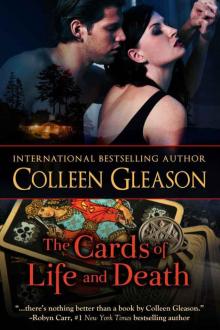 The Cards of Life and Death (Modern Gothic Romance 2)
The Cards of Life and Death (Modern Gothic Romance 2)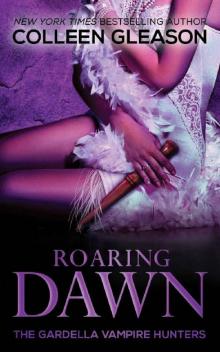 Roaring Dawn: Macey Book 3 (The Gardella Vampire Hunters 10)
Roaring Dawn: Macey Book 3 (The Gardella Vampire Hunters 10) Sinister Summer
Sinister Summer Sinister Sanctuary: A Ghost Story Romance & Mystery (Wicks Hollow Book 4)
Sinister Sanctuary: A Ghost Story Romance & Mystery (Wicks Hollow Book 4)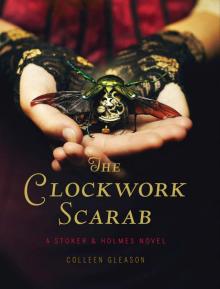 The Clockwork Scarab: A Stoker & Holmes Novel
The Clockwork Scarab: A Stoker & Holmes Novel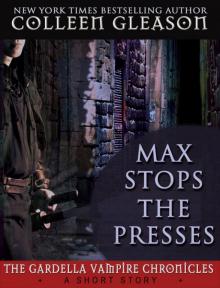 Max Stops the Presses
Max Stops the Presses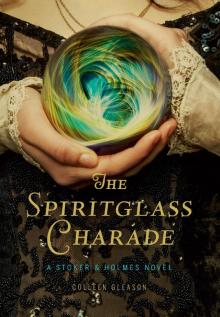 The Spiritglass Charade
The Spiritglass Charade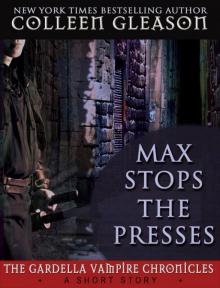 Max Stops the Presses: A Gardella Vampire Chronicles Short Story
Max Stops the Presses: A Gardella Vampire Chronicles Short Story Tempted by the Night
Tempted by the Night